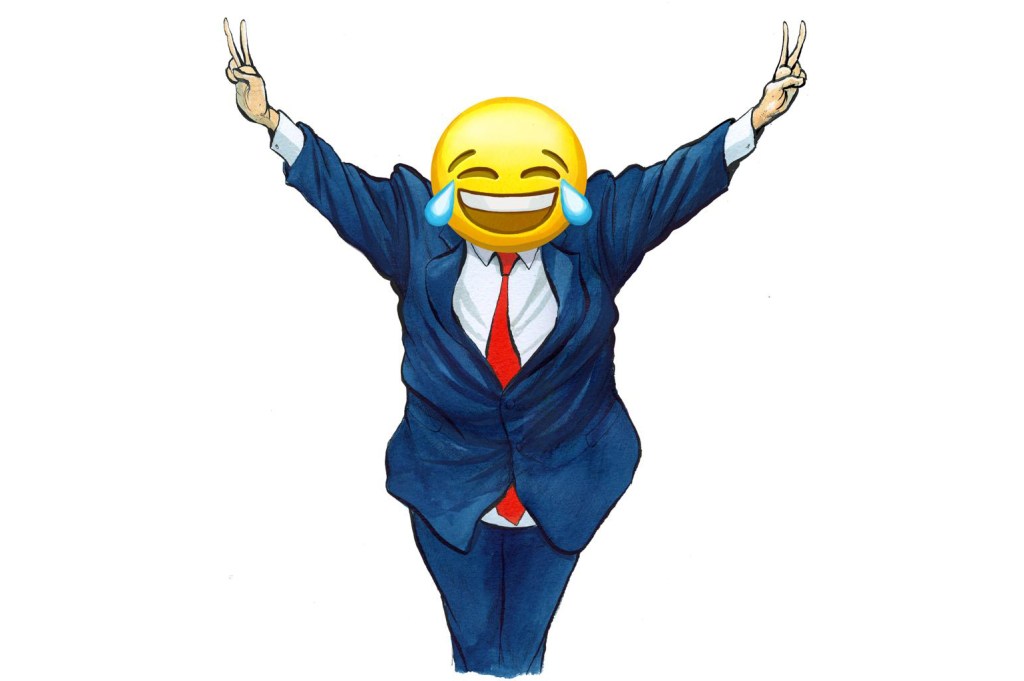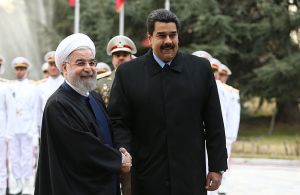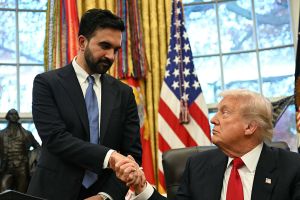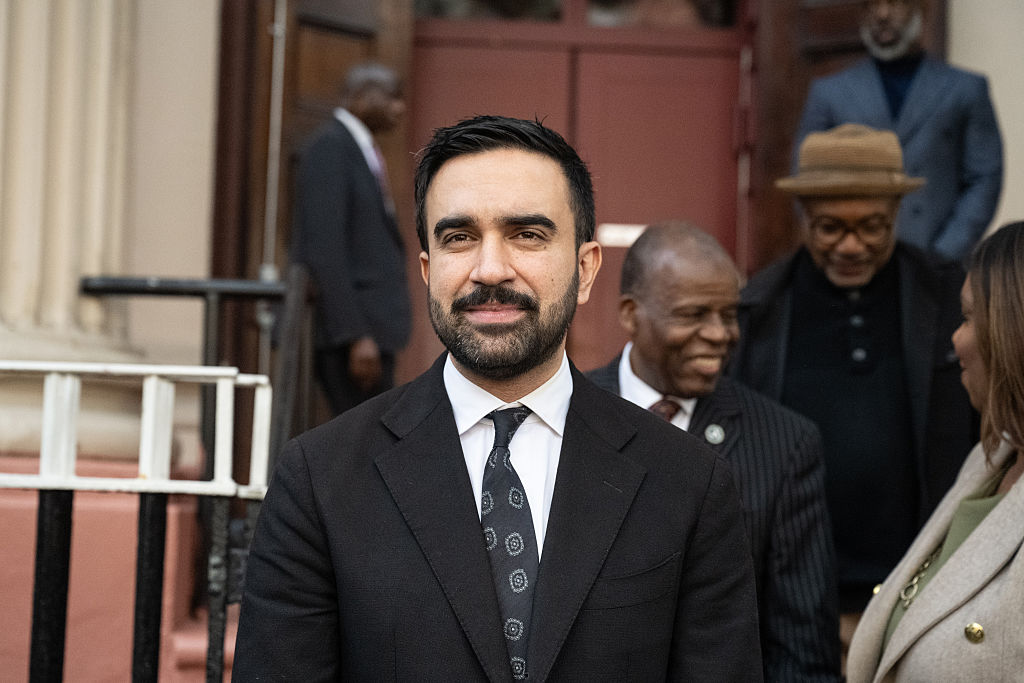This article is in
The Spectator’s inaugural US edition. Subscribe here to get yours.
One thing is now as obvious as a brick through a window: politics is the new comedy. Who in America believes that the road to 2020 will be paved with prudence, solemnity and fair campaigning? Nobody does. This election season will be defined by below-the-belt hits, salty jokes and juvenile comebacks, all delivered with the subtlety of an air horn blast. Already we have seen doddery Joe Biden challenge the president to a push-up contest on national television, while Bernie Sanders wants to take on Trump at a mile-long footrace. The president, according to the cerebral Andrew Yang, is ‘so fat’.
This is not an American phenomenon. Across democracies, old and new, the joke is in the ascendant. The age of LOLitics has dawned. After decades of indifference, voters increasingly mock systems they think absurd by empowering ridiculous figures. What difference, they ask, does it make if the president comes from Harvard Law or The Apprentice?
Most political careers used to end as jokes. Now they start as them. In Ukraine, the actor Volodymyr Zelensky was famous for playing a man who accidentally becomes president in the satirical drama Servant of the People. Fiction became fact when he ran for and won the presidency earlier this year. ‘I am not a politician at all,’ he said, and it was true. Ducking policy discussions, Zelensky instead smiled, joked and posted on Instagram during the campaign. His rival, the lumbering, buttery Petro Poroshenko, was reduced to warning the population: ‘This is no time to joke around.’
For successful politicians all over the world and those who support them, this is precisely the time to joke around. The jokes are not necessarily ones that your grandmother or liberal arts students would enjoy. Practitioners of LOLitics go all in for toilet humor and the rejection of linguistic norms. The president of the Philippines, Rodrigo Duterte, for instance, accused a journalist’s wife of having a ‘smelly vagina’ and said that he wanted to eat the livers of terrorists. Brazilian president Jair Bolsonaro told a female politician she was ‘too ugly’ to be raped. Vladimir Putin claimed that he’d take out criminals ‘while they are on the shitter’. In Italy, Matteo Salvini once compared the speaker of the Italian parliament to a sex doll which needed ‘deflating’. The British Prime Minister, Boris Johnson, lambasted Jeremy Corbyn for being a ‘great big girl’s blouse’. The collected put-downs of Donald Trump could fill several volumes.
Few of these LOLiticians would be in power without social media. Technology scholars have long argued, as Neil Postman did, that ‘the form in which ideas are expressed affects what those ideas will be’. Social media changed what was possible for outsider candidates to achieve in politics. If these figures often appear vitriolic, then that’s because this is what social media is like.
A platform such as Twitter provides a sliced-up reality of contextless moments, grotesque juxtapositions, advertisements, controversies, insults, clips of dogs farting and explosions of emotion masquerading as thought. This never-ending flow of scraps has no visible logic, is bound by no historical context, includes no time for reflection and catharsis. It is both alarmingly stupid and incredibly funny.
In the age of LOLitics, politicians are no longer competing among themselves to get a clever soundbite on the TV news. They are competing against the internet: the entire superabundance of human knowledge available at any time, in any place. To thrive they have to become live entertainers, never breaking the rule that it is better to be hated than to be boring. Boring people don’t trend. Trump does not simply use Twitter all the time; he is actually like Twitter: instinctive, improvisational, perpetually generating memes.
LOLiticians such as Trump manipulated voter apathy, not voter anger, in order to seize power. The great boredom began in the late 1990s, forgettable years of political packaging, ‘spin’, focus-grouped shrewdness and voter passivity. Indifference went deep; participation in elections fell and party membership declined.
Political historians should label it the ‘they’re all the same’ era. The publics were bored. For a while, electorates faced a choice between different squads of low-experience leaders with the same policies. What was so unappealing about these people? Surveying a US presidential primary field early in the century, the novelist David Foster Wallace wrote that the candidates were ‘men who aren’t enough like human beings even to hate — what one feels when they loom into view is just an overwhelming lack of interest’. This disconnect between rulers and ruled grew relentlessly.
If this disenchantment bothered politicians, they didn’t show it. If anything, they were intensely optimistic about the future. Bill Clinton struck a techno-utopian note in his final State of the Union address in 2000: ‘We are fortunate to be alive at this moment in history… I believe the computer and the internet give us the chance to move more people out of poverty more quickly than at any time in all of human history.’
Clinton believed that the forces shaping the new millennium — globalization and the internet — would be win-win solutions for the problems facing the world. A prosperous America had ‘crossed the bridge we built to the 21st century’. But on the other side of Clinton’s bridge was not an informed citizenry unleashed by free markets. A new breed of freewheeling political joker emerged: Trump, Salvini, Nigel Farage, Duterte, Bolsonaro. The internet, which Clinton saw as a tool to wipe out poverty in Asia and Africa, was instead used to undermine professional politicians.
A generation of centrist politicians who arrived too late to be convincing social media users — Hillary Clinton, Theresa May, Matteo Renzi, Australia’s Julia Gillard, Nancy Pelosi — were left looking sanctimonious and servile. They came up through a stage-managed political culture that manufactured ‘down-to-earth’ politicians who could convince ‘real, ordinary, hard-working people’ to ‘have a beer’ with them. In the age of LOLitics all of that is out. Troll farms, meme armies and the savage roasting of one’s opponents are in.
For centrists of the past, culture meant giving another honorary degree to Toni Morrison. But Clinton’s beloved internet — spread far and wide by his beloved globalization — has permanently changed the culture. Under digital conditions, politics is more pornographic, more outrageous and more vindictive; darker, stranger and faster than ever. There is no seawall to keep this great wave of radical nonsense from crashing over the political world. Critics of LOLitics try to stem its tide by questioning the sanity of their opponents and erecting intricate historical analogies that prove we have returned to the 1930s. This drives them mad. They end up sounding like puritanical hecklers yelling at the comedians and spoiling the fun. But the LOLitics wave won’t amuse us forever, and critics are right to sound the alarm. Comedy leaders aren’t just undermining the pompous façade of the democratic establishment: they may well end up bringing down the house.
This article is in The Spectator’s inaugural US edition. Subscribe here to get yours.



























